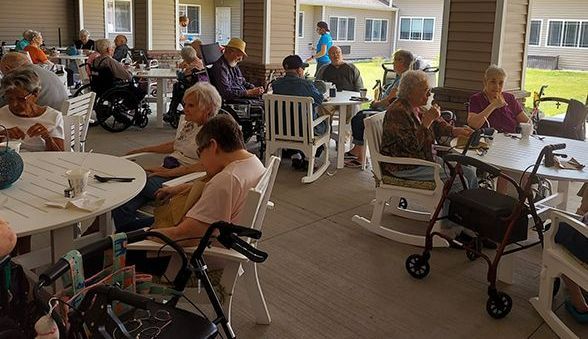Understanding the Differences In Between Assisted Living Facility and Memory Treatment for Elderly Liked Ones
When taking into consideration care options for senior loved ones, it is important to understand the differences between nursing homes and memory treatment centers. From the specialized focus on cognitive and psychological health in memory care to the thorough clinical attention readily available in taking care of homes, each establishing provides to special needs.
Secret Distinctions Between Nursing Homes and Memory Care

On the various other hand, memory treatment facilities are specialized areas that provide particularly to people with Alzheimer's condition, dementia, or various other memory-related problems. These facilities offer a protected setting with trained team that are well-informed regarding the unique challenges encountered by locals with memory disabilities. Memory treatment programs concentrate on preserving an organized routine, cognitive excitement, and tasks to support memory feature.
While assisted living facility give a wider variety of care services for senior citizens with varying requirements, memory treatment facilities supply specialized take care of those especially taking care of memory loss problems. Understanding these differences is vital in selecting the most suitable choice for your liked one's treatment.
Degree of Treatment Offered
The degree of clinical treatment provided in nursing homes and memory treatment facilities significantly varies based on the specialized needs of the residents. Nursing homes generally supply extra comprehensive medical treatment services contrasted to memory care facilities.

Ultimately, the level of treatment offered in nursing homes and memory care facilities is tailored to fulfill the details needs of the homeowners, with retirement home providing more extensive medical services and memory treatment facilities concentrating on mental deterioration treatment.
Focus on Cognitive and Emotional Assistance
Given the specific nature of memory treatment facilities, vital attention is routed in the direction of fostering cognitive and psychological support for people with Alzheimer's condition or various other kinds of dementia. Memory care centers are especially created to provide to the unique needs of locals with cognitive disabilities.
Cognitive assistance in memory treatment facilities commonly entails memory improvement workouts, cognitive therapy programs, and memory tasks intended at reducing cognitive decrease and enhancing total brain feature. Psychological assistance is offered through find more thoughtful care techniques, personalized attention, and opportunities for social engagement to lower feelings of isolation and isolation commonly experienced by people with dementia. By focusing on cognitive excitement and psychological health, memory care centers make every effort to enhance the lifestyle and overall fulfillment of residents dealing with memory loss problems.
Personnel Training and Competence
To ensure the efficient arrangement of psychological and cognitive assistance in memory treatment facilities, staff training and know-how play a vital function in meeting the specialized demands of people with Alzheimer's illness or various other forms of mental deterioration. Team member in memory care facilities ought to undertake customized training programs that concentrate on mental deterioration treatment, communication methods, behavior management, and creating a secure and stimulating atmosphere for homeowners. Continuous education and training are necessary to keep personnel upgraded on the most recent research study and best practices in mental deterioration care.
In enhancement to formal training, team proficiency also encompasses qualities such as concern, perseverance, and compassion. Working with individuals that have dementia requires a high degree of sensitivity and recognizing to properly address their one-of-a-kind needs and habits. Personnel must be equipped with the skills to connect properly, de-escalate challenging situations, and offer person-centered treatment that respects the self-respect and autonomy of citizens.
Inevitably, the high quality of care supplied in memory care centers is straight influenced by the training and knowledge of the staff. Spending in constant training and expert development guarantees that homeowners receive the greatest standard of care customized to their individual requirements and choices.
Factors To Consider for Lifestyle
Among the complexities of offering care for individuals with Alzheimer's illness or dementia, focusing on factors to consider for top quality of life becomes paramount - Senior Living. When picking between assisted living facility and memory care centers for senior liked ones with cognitive problems, the emphasis on enhancing lifestyle is important. Quality of life considerations encompass numerous facets beyond healthcare, such as psychological wellness, social interactions, and tasks that advertise self-respect and independence
In memory read here care centers, specialized programs customized to the one-of-a-kind requirements of people with memory problems play a significant function in boosting their top quality of life. These programs commonly include memory-enhancing activities, structured routines, and cognitive stimulation workouts designed to preserve cognitive features and slow down down the progression of the condition. Additionally, the physical atmosphere in memory treatment centers is commonly designed to be very easy and safe to navigate, decreasing confusion and anxiousness among citizens.
Ultimately, prioritizing top quality of life factors to consider in both assisted living home and memory treatment settings can considerably influence the wellness and joy of elderly people with Alzheimer's disease or dementia.
Final Thought
Finally, recognizing the distinctions between nursing homes and memory treatment facilities is vital when considering the most effective look after elderly enjoyed ones. While assisted living home provide a higher level of clinical care, memory care centers concentrate on emotional and cognitive assistance. Staff training and proficiency likewise play a considerable role in the quality of care supplied. Ultimately, selecting the right option can substantially impact the lifestyle for senior individuals. Senior Living.
When thinking about care choices for elderly liked ones, it is vital to understand the distinctions between nursing homes and memory care facilities.The degree of clinical treatment provided in nursing homes and memory treatment facilities considerably varies based on the specialized requirements of the residents. Nursing homes usually supply extra extensive clinical care solutions compared to memory care centers.In conclusion, comprehending the distinctions between nursing homes and memory care centers is essential when considering the ideal care for senior enjoyed ones. check this While nursing homes offer a greater degree of medical treatment, memory treatment facilities focus on psychological and cognitive support.
Comments on “Assisted Living Facility: Empowering Freedom with Compassionate Care”